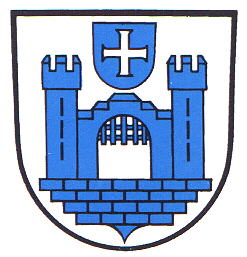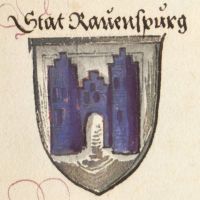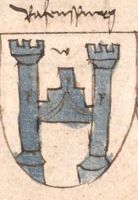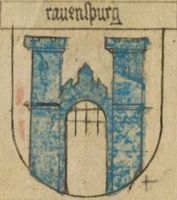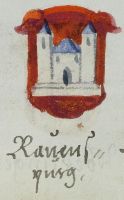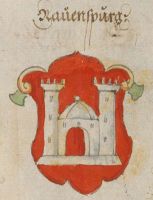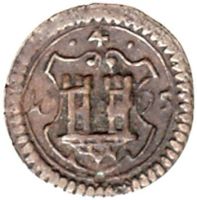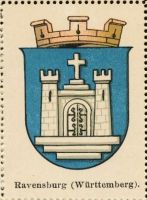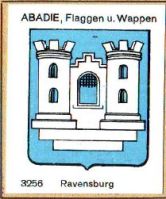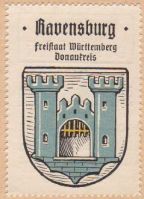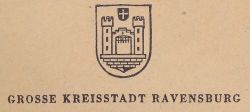Ravensburg: Difference between revisions
Knorrepoes (talk | contribs) m (Text replacement - "<gallery widths=250px heights=200px perrow=0>↵" to "===Image Gallery=== <gallery widths=250px heights=200px perrow=0> ") |
Knorrepoes (talk | contribs) m (Text replacement - "===Image Gallery===" to "===Image gallery===") |
||
| Line 22: | Line 22: | ||
The town was founded by the Lords of Welfen in the 12<sup>th</sup> century. It became a free imperial city in the 15<sup>th</sup> century and was incorporated in Württemberg in 1810. The arms show a castle, which already appeared on seals from the 13<sup>th</sup> century and on the arms in 1400. On a seal from 1270 the small shield with the cross appears. There are two possible origins for the cross. The first is that they are a memory of Konrad of Hohenstaufen, who originated from the area, and who became King of Jerusalem. The cross is the arms of Jerusalem and were placed in the arms to his honour. Another, more likely, explanation is that the cross is the symbol of Duke Welf IV (died 1107) who was a crusader and brought a piece of the cross of Christ back to the monastery in [Weingarten]]. | The town was founded by the Lords of Welfen in the 12<sup>th</sup> century. It became a free imperial city in the 15<sup>th</sup> century and was incorporated in Württemberg in 1810. The arms show a castle, which already appeared on seals from the 13<sup>th</sup> century and on the arms in 1400. On a seal from 1270 the small shield with the cross appears. There are two possible origins for the cross. The first is that they are a memory of Konrad of Hohenstaufen, who originated from the area, and who became King of Jerusalem. The cross is the arms of Jerusalem and were placed in the arms to his honour. Another, more likely, explanation is that the cross is the symbol of Duke Welf IV (died 1107) who was a crusader and brought a piece of the cross of Christ back to the monastery in [Weingarten]]. | ||
===Image | ===Image gallery=== | ||
<gallery widths=250px heights=200px perrow=0> | <gallery widths=250px heights=200px perrow=0> | ||
File:Ravensburg1500.jpg|alt=Wappen von Ravensburg/Arms (crest) of Ravensburg|The arms around 1500 | File:Ravensburg1500.jpg|alt=Wappen von Ravensburg/Arms (crest) of Ravensburg|The arms around 1500 | ||
Revision as of 08:27, 3 September 2023
RAVENSBURG
State : Baden-Württemberg
District (Kreis) : Ravensburg
Additions : 1972 : Schmalegg, Taldorf; 1974 Adelsreute, Eschach
| German | In Silber auf gemauerter blauer Konsole eine doppeltürmige blaue Burg mit hochgezogenem Fallgatter; zwischen den Zinnentürmen ein blauer Schild, darin ein silbernes Kreuz mit Tatzenenden. |
| English | blazon wanted |
Origin/meaning
The town was founded by the Lords of Welfen in the 12th century. It became a free imperial city in the 15th century and was incorporated in Württemberg in 1810. The arms show a castle, which already appeared on seals from the 13th century and on the arms in 1400. On a seal from 1270 the small shield with the cross appears. There are two possible origins for the cross. The first is that they are a memory of Konrad of Hohenstaufen, who originated from the area, and who became King of Jerusalem. The cross is the arms of Jerusalem and were placed in the arms to his honour. Another, more likely, explanation is that the cross is the symbol of Duke Welf IV (died 1107) who was a crusader and brought a piece of the cross of Christ back to the monastery in [Weingarten]].
Image gallery
The arms in a 16th century manuscript
The arms in the Wappen-Sammlung (+/- 1910)
The arms in the Abadie albums
The arms by Hupp in the Kaffee Hag albums +/- 1925
Literature: Stadler, 1964-1971, 8 volumes.
This page is part of the German heraldry portal |
Heraldry of the World |
|
German heraldry:
|
Selected collector's items from Germany:
|
Contact and Support
Partners:
Your logo here ?
Contact us
© since 1995, Heraldry of the World, Ralf Hartemink 
Index of the site
